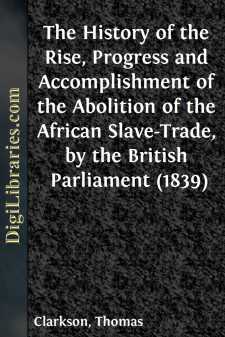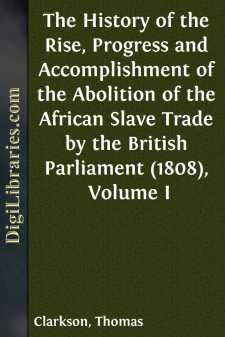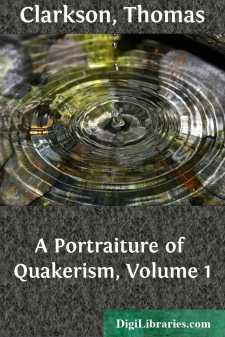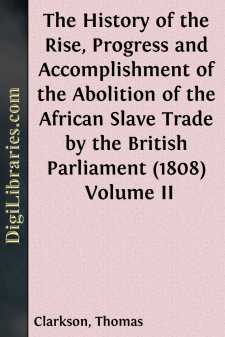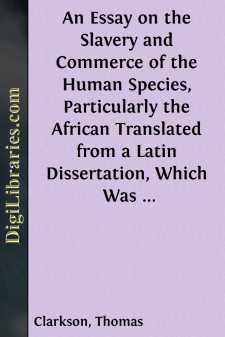Categories
- Antiques & Collectibles 13
- Architecture 36
- Art 48
- Bibles 22
- Biography & Autobiography 815
- Body, Mind & Spirit 144
- Business & Economics 28
- Children's Books 18
- Children's Fiction 14
- Computers 4
- Cooking 94
- Crafts & Hobbies 4
- Drama 346
- Education 58
- Family & Relationships 59
- Fiction 11833
- Games 19
- Gardening 17
- Health & Fitness 34
- History 1378
- House & Home 1
- Humor 147
- Juvenile Fiction 1873
- Juvenile Nonfiction 202
- Language Arts & Disciplines 89
- Law 16
- Literary Collections 686
- Literary Criticism 179
- Mathematics 13
- Medical 41
- Music 40
- Nature 179
- Non-Classifiable 1768
- Performing Arts 7
- Periodicals 1453
- Philosophy 65
- Photography 2
- Poetry 896
- Political Science 203
- Psychology 44
- Reference 154
- Religion 515
- Science 126
- Self-Help 85
- Social Science 82
- Sports & Recreation 34
- Study Aids 3
- Technology & Engineering 59
- Transportation 23
- Travel 463
- True Crime 29
Thomas Clarkson
Thomas Clarkson was a prominent British abolitionist and one of the leading campaigners against the transatlantic slave trade in the late 18th and early 19th centuries. He co-founded the Society for Effecting the Abolition of the Slave Trade in 1787, working alongside notable figures like William Wilberforce. Clarkson's extensive research and compelling writings, including his influential pamphlet "An Essay on the Slavery and Commerce of the Human Species," played a crucial role in raising public awareness and galvanizing support for the abolitionist cause.
Author's Books:
Sort by:
by:
Thomas Clarkson
CHAPTER I. HISTORY OF THE ABOLITION OF THE SLAVE TRADE. No subject more pleasing than that of the removal of evils.—Evils have existed almost from the beginning of the world; but there is a power in our nature to counteract them—this power increased by Christianity.—Of the evils removed by Christianity one of the greatest is the Slave Trade.—The joy we ought to feel on its abolition from a...
more...
by:
Thomas Clarkson
CHAPTER I. No subject more pleasing than that of the removal of evils—Evils have existed almost from the beginning of the world—but there is a power in our nature to counteract them—this power increased by Christianity—of the evils removed by Christianity one of the greatest is the Slave-trade—The joy we ought to feel on its abolition from a contemplation of the nature of it—and of the...
more...
by:
Thomas Clarkson
THOUGHTS, &c. I know of no subject, where humanity and justice, as well as public and private interest, would be more intimately united than in that, which should recommend a mitigation of the slavery, with a view afterwards to the emancipation of the Negroes, wherever such may be held in bondage. This subject was taken up for consideration, so early as when the Abolition of the slave trade was...
more...
by:
Thomas Clarkson
INTRODUCTION. MOTIVES FOR THE UNDERTAKING—ORIGIN OF THE NAME OF QUAKERS—GEORGE FOX, THE FOUNDER OF THE SOCIETY-SHORT HISTORY OF HIS LIFE. From the year 1787, when I began to devote my labours to the abolition of the slave trade, I was thrown frequently into the company of the people, called Quakers, these people had been then long unanimous upon this subject. Indeed they had placed it among the...
more...
by:
Thomas Clarkson
CHAPTER I. Continuation from June 1788 to July 1789—Author travels to collect further evidence—great difficulties in obtaining it—forms committees on his tour—Privy council resume the examinations—inspect cabinet of African productions—obliged to leave many of the witnesses in behalf of the abolition unexamined—prepare their report—Labours of the committee in the interim—Proceedings...
more...
by:
Thomas Clarkson
PART I. When civilized, as well as barbarous nations, have been found, through a long succession of ages, uniformly to concur in the same customs, there seems to arise a presumption, that such customs are not only eminently useful, but are founded also on the principles of justice. Such is the case with respect to Slavery: it has had the concurrence of all the nations, which history has recorded, and...
more...
by:
Thomas Clarkson
CHAP. I. SECTION I. Marriage—Quakers differ in many respects from others, on the subject of Marriage—George Fox introduced Regulations concerning it—Protested against the usual manner of the celebration of it—Gave an example of what he recommended—Present regulations of the Quakers on this subject. In the continuation of the Customs of the Quakers, a subject which I purpose to resume in the...
more...
by:
Thomas Clarkson
CHAP. I. Civil government—First tenet is, that governors have no right to interfere with the governed on the subject of Religion—and that if they interfere, and insist upon things which the conscience disapproves, the governed ought to refuse a compliance with them, and to bear patiently all the penalties annexed to such a refusal, but never to resist the governors by violence on this or any other...
more...


